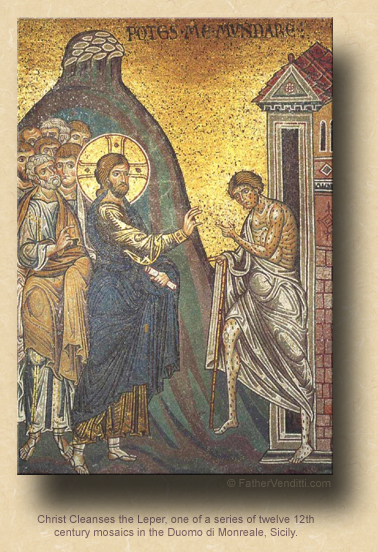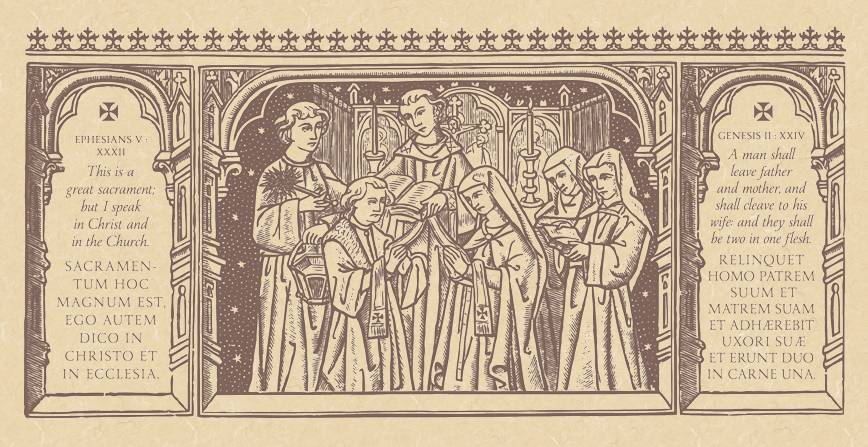The Messianic Secret & the Seal of Confession.
The Twelfth Friday of Ordinary Time.
Lessons from the primary feria, according to the ordinary form of the Roman Rite:
• Genesis 17: 1, 9-10, 15-22.
• Psalm 128: 1-5.
• Matthew 8: 1-4.
The Third Class Feast of Saints John & Paul, Martyrs.*
First & second lessons from the proper, third lesson from the common, according to the extraordinary form of the Roman Rite:
• Ecclesiasticus 44: 10-15.
• Psalm 132: 1-2.
• Luke 12: 1-8.
The Fourth Friday of the Apostles Fast; the Feast of Our Venerable Father David of Thessalonica; the Commemoration of the Passing of the Blessed Martyrs Andrew Ishchak & Nicholas Konrad, Priests, & Vladimir Pryjma, Cantor.
Lessons from the pentecostarion, according to the Ruthenian recension of the Byzantine Rite:
• Romans 16: 1-16.
• Matthew 13: 4-9.
FatherVenditti.com
|
 8:48 AM 6/26/2015 — Since their inception, the United States, by means of an arrangement of convenience, have allowed Catholic priests—and ministers of other faiths—to act as agents of the state, simultaneously solemnizing the Sacrament of Matrimony and the civil effects of the marriage contract. With today's ruling, it is my purely personal opinion that no Catholic priest can, in good conscious, continue to perform the civil function; and, I have no doubt that action will soon be taken in the courts to attempt to require them to abandon this role anyway, ultimately requiring what is the common practice in many other countries, with couples submitting to two marriage ceremonies: one in church and one at the courthouse. I am grateful that I am no longer assigned to parish ministry, as my current assignment does not provide jurisdiction to witness marriages. I offer my prayers for parish priests, and for the bishops of our country who must now navigate the murky waters of this clearly anti-Catholic and anti-Christian decision. Now, to today's Gospel lesson: 8:48 AM 6/26/2015 — Since their inception, the United States, by means of an arrangement of convenience, have allowed Catholic priests—and ministers of other faiths—to act as agents of the state, simultaneously solemnizing the Sacrament of Matrimony and the civil effects of the marriage contract. With today's ruling, it is my purely personal opinion that no Catholic priest can, in good conscious, continue to perform the civil function; and, I have no doubt that action will soon be taken in the courts to attempt to require them to abandon this role anyway, ultimately requiring what is the common practice in many other countries, with couples submitting to two marriage ceremonies: one in church and one at the courthouse. I am grateful that I am no longer assigned to parish ministry, as my current assignment does not provide jurisdiction to witness marriages. I offer my prayers for parish priests, and for the bishops of our country who must now navigate the murky waters of this clearly anti-Catholic and anti-Christian decision. Now, to today's Gospel lesson:
Today's Gospel lesson is an example of what Scripture scholars call the “messianic secret”: Jesus reveals to His disciples who He is, but hides His true identity to the general public. How many times have we read of Him speaking to the multitudes in cryptic parables, explaining their meaning only in private to his closest disciples, leaving everyone else to think about it? The reason for the messianic secret is unknown;—to know it would be to know the mind of God—and today, we have a rather explicit example of it in our very brief Gospel lesson, with our Lord sternly warning the leper whom He's cured to tell no one about Him. The messianic secret is found principally in Mark's Gospel, but elements of it appear now and then here in Matthew.
Some people choose to interpret it in purely pietistic terms, saying that our Lord is simply showing His humility in not wanting to be lauded or praised. I think that's a little simplistic, especially since this command to keep what He's done for someone a secret is not applied universally; He only requires it in certain cases, and I don't think there's a way to figure out why. In this case it may be purely practical, since our Lord is on the move, and every time a crowd gathers around Him He has to stop and deal with them; but, more often than not there's a mystical component to the messianic secret that I don't think we'll ever understand beyond the realm of conjecture.
But the other element in this short lesson worthy of our meditation is the command our Lord gives the leper to “go, show yourself to the priest” (Mark 1: 44 NABRE), and there's a reason for this. The Law of Moses is very explicit about the handling of those with skin diseases, outlined in painstaking detail in the Book of Leviticus (cf. Leviticus 13: 38-46). Leviticus thirteen gives the Jewish priest detailed instructions about how to identify leprosy, and what to do with someone who has it. Of course, there's little doubt that what's being described there is not the Hansen's Disease of modern times, nor can we presume that a Jewish priest in the time of the Pentateuch would have had the medical knowledge to diagnose genuine leprosy if he saw it.
What's important for us to remember is that this Levitical proscription is founded upon the Semitic notion, prevalent right through to our Lord's time, that chronic illness was the result of sin. Remember when our Lord encountered the man born blind, His disciples ask him: “Master, was this man guilty of sin, or was it his parents, that he should have been born blind?” (John 9: 3). It makes no sense to us to identify illness or handicap with sin, unless we have embraced the Biblical understanding that sin is a sickness. What's being described in the Book of Leviticus is a precursor of the Sacrament of Penance because, not only is it the job of the priest to declare a person unclean, it's also his job to declare a person clean after a proper examination. This is why our Lord commands the man He's cured to go and show himself to the priest. Once the priest at the temple declares him clean again, the law requires that he offer a sacrifice in thanksgiving to God; until he does so, he cannot reenter the temple, just as we cannot receive our Blessed Lord in Holy Communion until we have been cleansed from sin by the priest: hence, our Lord tells him, “… offer for your cleansing what Moses prescribed …” (v. 44).
And, just as an aside, here may be a way for us to interpret the messianic secret, at least in this particular case: it's a foreshadowing of the seal of confession.
So, let's make one of our resolutions in this Mass to thank our Lord for the great gift He offers us in the confessional, and make frequent use of it. Sin is a sickness, a sickness that excludes us from the Temple of our Lord's Sacred Body and Precious Blood; and, it is Christ alone, in the person of the priest, who cures that sickness and declares us clean again.

* This feast does not pertain to the Apostles. These two brothers were officers under Constantius. After the death of this Christian Emperor, they became martyrs at Rome in the persecution of Julian the Apostate in 362.
|

